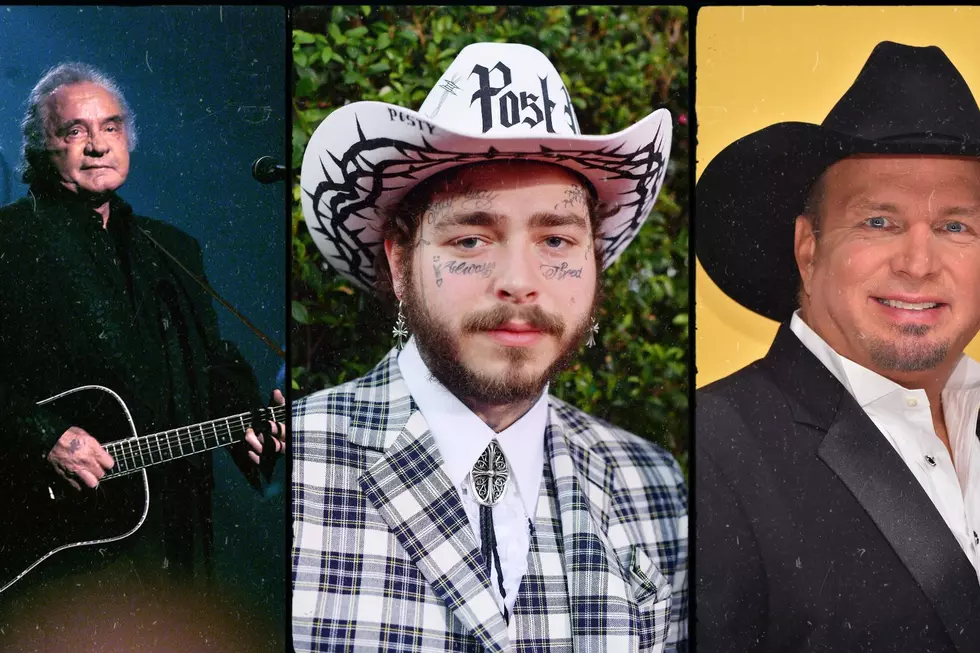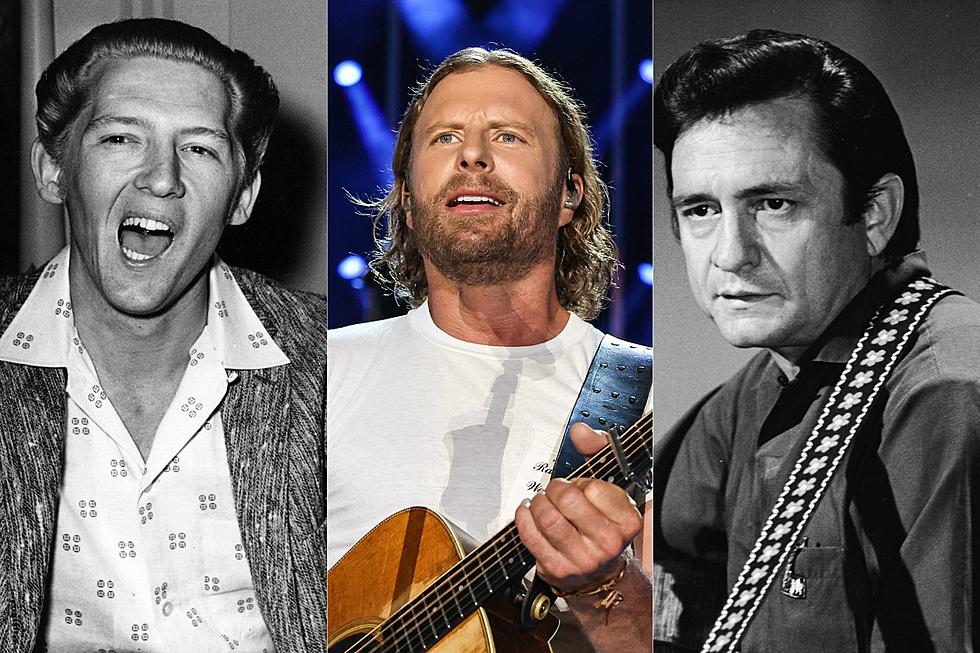
John Carter Cash Moves Forward With New Album While Embracing His Family Legacy
John Carter Cash has a deep legacy in country music, but he's also just a working musician. The Grammy-winning producer and artist has just released a new album, We Must Believe in Magic, but that's far from the only thing he has going on.
Cash is the only child from Johnny Cash's marriage to June Carter Cash, and he's an accomplished musician in his own right. Most notable as a producer for acts including Sheryl Crow, Willie Nelson, Elvis Costello, Jewel and Vince Gill, Cash had not released an album of his own since 2010 before he released We Must Believe in Magic in July. He's also written a new cookbook, The Cash and Carter Family Cookbook, that draws on his family legacy.
We Must Believe in Magic features appearances from a wide range of guest artists, including Tony Rice, the Fisk Jubilee Singers, Jerry Douglas, Etta Britt, Charlie McCoy, Tony Harrell, Jamie Hartford, Sam Bush, Ira Dean, Ronnie and Rob McCoury and many more. Cash also collaborated with a range of impressive songwriters including Bill Miller, Shawn Camp, and Wesley Orbison.
Cash has also been working on mixes for Loreta Lynn's much-anticipated next album, and he recently spoke to Taste of Country about his new album, his cookbook, his family and the weight of that legacy in a wide-ranging interview.
You stay pretty busy. What made this the right time for a new album from you as an artist?
I always follow my heart creatively, and We Must Believe in Magic has been 10 years in the works. I do so many other projects, it takes whatever time it takes to do an album, and it's finished when it's finished. I like to look back over it a few months later, and I'd probably never finish if I didn't make myself finish eventually. It's just a matter of due course. I'm always writing my own music, recording my own music, even if I am 9/10 of the time recording stuff for other people. I'm still working on my own creative endeavors.
Of course, if you're a songwriter you almost have to do that.
The muse doesn't necessarily give you the option. [Laughs].
What was the seed of the idea for the project?
My last album came out in 2010, but I think I recorded a couple of things on this album in 2008, maybe early 2009. Just songs that I've been excited about that I'd written. I just went in and recorded a couple of things, and then I think in 2011, I was talking to [legendary guitarist] Tony Rice, and I said, "Man, would you like to come and record something?" So that was part of it, was the chance to work with Tony, whom I've respected for so long. Some people in the industry you just connect to, and Tony I just connected to.
I had the chance to go in and record with some of the A pickers from the '60s, and I've worked with some of them for years and years. Those sessions were unforgettable. I also got to work with my wife, Ana Cristina; she came in and recorded on some of the songs. It was just, the heart's destination led me down the path.
This is an ambitious record with a lot of songs that hang together conceptually. At what point did that become the intent, or is that the intent? Am I reading into that?
The concept was magic, that we follow our heart, and there's also, I usually have a story song in what I do. There's some of those. I was greatly influenced by [Bruce] Springsteen growing up, and [Bob] Dylan, and the story songs that Bruce did for Nebraska had a lot to do with my writing style. Also, I was listening to the melodies of the old ragtime stuff and the old gospel songs from the turn of the century.
Also, Jack Clement passed away during those years. I was always so close to Jack, and I used to sit with him before I ever started to be a record producer and just listen to him talk. I'd ask him questions, and he'd give me direction. It was years later that I decided to start doing records, and Cowboy gave me some advice early on. He knocked me around when I needed it a couple of times. [Laughs]. So I wanted to dedicate it to him, and to my mother, because she always believed in the potential of dreams becoming reality, and that's sort of what this record is about.
See Inside the Johnny Cash Museum in Nashville
You got in a few covers on the album, most notably Nine Inch Nails' "Hurt." That's a song that is so widely associated with your father; did you have any trepidation about the inevitable comparisons?
I knew it very well when Downward Spiral came out. I was very connected with that album, and it changed my life, just because of where I was personally at the time. So when my dad went into the studio to record it — [producer] Rick [Rubin] suggested it, and I said, "Are you sure you want to do this, Dad?" And he said, "Well, it's true to my life." So I was with him in California, and he went into this studio in Rick's basement, and the day that we recorded the track, I sang the scratch vocal.
I took him back to the hotel after we recorded it, and he sat and learned it listening to my scratch vocal. So there's a real connection on that level, and on a more personal level, the song is just, I've been there. [Laughs]. Mr. Reznor had also. So there's a personal connection beyond the fact that my dad recorded it. I don't really care what anyone else thinks. I know what it means to me.
You're not only a producer, artist and novelist in your own right, you're also perceived as being your family archivist, a historian if you will; somebody who's seen as keeping the family legacy alive. Is there an up and a downside to that for you? I'm thinking particularly about when you were younger, stepping into a legacy that you couldn't have predicted or chosen, because you were born into it.
Yeah. In some ways, Cash and Carter is a family business that's been handed to me. There's some of us that would have done it and some of us that wouldn't, and I wasn't trained to do it. But all my life I've been surrounded by Carter and Cash, and I saw how my parents handled themselves, and how they separated their creative life and entertainment from their own personal reality of who they were.
It's part of me. It's partly a job to me, but it's also a way to connect with my parents on a personal level. Here we are talking about them; I'll never get away from talking about my mother and my father. I've learned to embrace it, and I've also learned that there's a certain responsibility that comes along with it. About six months ago, I got an email from a kid that is 17 years old, and he said, "If it hadn't been for me listening to your father sing, I'd be dead right now." He was depressed and in such dire straits, and he said, "Because your dad got back up and changed his life, I had the strength to do it."
There's a responsibility that comes with that, because I want that person to know who my dad really was. I could have chosen that this is not going to be any part of my life, I'm going to do something else. But I've found joy in music, and I've found joy in respecting heritage. In some ways I've gone to Cash and Carter graduate school [Laughs].
What is the age range of your own kids?
My eldest, Joseph, is 22. AnnaBelle is 17, and then my son Jack is 12. My youngest, Grace, is nine months.
The older ones probably understand the family legacy, but not the younger ones. At what point do you try to introduce that topic, or do you just let it sink in that, "Hey, you're born into an unusual set of circumstances"?
I pretty much let them figure it out for themselves. I had to figure it out for myself. I really took the Carter Family stuff for granted until I was about 30 years old, and then I went, "Wait a second, I love this." And then I started studying it, and it became a different part of my life. I believe you have to be passionate about something to really take it into your heart, so if they want to be a doctor or a lawyer, I'll support them just as much. It depends on what they love. That's how my parents were with me. If I'd have done something different, they would have supported that, also. Of course, they put me on stage from when I could walk! [Laughs]. It's hard to turn down that kind of energy coming from an audience. It was also what my mother grew up with; she grew up with her family's music. My kids are growing up slightly differently, so we'll see.
You also have a cookbook that's just come out. What was the genesis of that?
I love to cook, man, I'm the short-order cook of the house. It's also my creativity. The kitchen is my space. I'm always cooking, I'm always making something. My mother was a great cook, and she taught me how to make some of the dishes that are in the cookbook. I modified them to make them my own, sort of, and then my father, there's a recipe that's my version of his chili that's in there. He was also a great cook, and he loved fried foods, Southern foods, but I also grew up around international foods, so there's a lot of recipes in there from around the world. It's not only Southern cooking.
John Carter Cash's new album, We Must Believe in Magic, is now available. The Cash and Carter Family Cookbook is set for release on Sept. 25, featuring not only recipes from the Cash and Carter family, but also recipes and favorite memories from the Cash's table from family friends including Loretta Lynn, Lisa and Kris Kristofferson, Billy Bob Thornton, Jane Seymour and U2’s Adam Clayton.
More From Taste of Country

![See Inside Johnny Cash’s Spectacular Real Estate Holdings [Pictures]](http://townsquare.media/site/204/files/2024/04/attachment-johnny-cash-real-estate.jpg?w=980&q=75)
![Iconic $6.25 Million Johnny Cash Family Estate for Sale — See Inside! [Pictures]](http://townsquare.media/site/204/files/2024/03/attachment-johnny-cash-family-estate-pictures.jpg?w=980&q=75)




![Remember When Johnny + June Cash’s Stunning Lakefront Estate Went Up for Sale? [Pictures]](http://townsquare.media/site/204/files/2024/01/attachment-johnny-cash-nashville-lakefront-estate-pictures.jpg?w=980&q=75)

